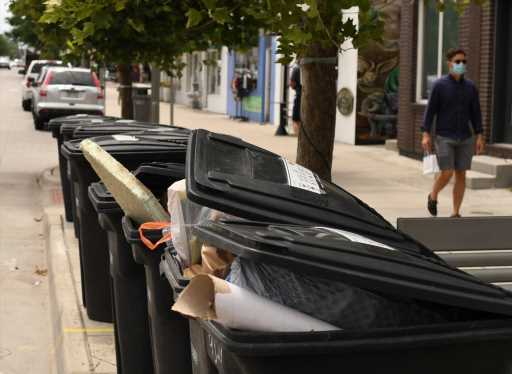Denver City Council approves pay-as-you-throw trash fees; residents will start paying in 2023
Denver residents accustomed to trash trucks coming to empty their black bins of refuse every week without ever having to see a bill for that service may want to revisit their budgets.
The City Council voted 8-5 on Monday night to overhaul Denver’s solid waste collection program, making weekly recycling and composting free but setting up monthly fees for collections of trash headed to the landfill.
The so-called “pay-as-you-throw” trash format will mean that starting next year residents of single-family homes and apartment buildings of seven or fewer units will pay between $9 and $21 per month for trash pickup depending on the size of their trash bins. Over the course of an entire year, that could add up to $252 per property for people who use the largest 95-gallon bins.
Denver taxpayers now pay for trash collection services indirectly. The money comes out of the city’s general fund. The change, under consideration in some form or another for roughly two decades, is aimed at increasing the amount of trash the city diverts from landfills, thereby reducing greenhouse gas emissions. For now, the only trash collection service the city charges for is compost, $9.75 a month.
Of the waste collected from residential customers in Denver today, 74% goes to the city’s landfill. That’s below the national average of 34% and far behind some peer cities that already use a pay-as-you-throw approach. Nearby Loveland has a 58% diversion rate, according to a staff presentation.
“It is irresponsible for us to throw things out that can be reused and recycled,” Councilman Jolon Clarksaid before voting in favor of the program. “We are then complicit in the destruction of our home.”
During an hour-long public hearing, supporters, many clad in green shirts, emphasized the urgency of enacting changes that make a dent in the city’s greenhouse gas emissions and fighting worsening climate change.
“(This will be) a great help toward our diversion goals,” said Taylor Reimann, who serves on the city’s zero waste advisory committee. “People who throw out less trash are currently subsidizing those that don’t recycle or compost.”
Opponents pointed out the city is preparing to add a new fee on roughly 180,000 households at a time when records gas prices and painful inflation are already putting pressure on budgets. Seniors living on fixed incomes are particularly vulnerable.
“I am interested in sustainability but, believe me, I am more interested in human sustainability,” Margaret Atencio said in urging council members to vote no.
Related Articles
Politics |
If pay-as-you-throw trash overhaul comes to Denver, leaders want outreach program for residentsPolitics |
Denver may start charging for trash pickup, issuing citations for garbage in recycling binsPolitics |
Denver compacts trash routes, forcing 70% of residents to switch pickup days in January
Just more than $25 million was budgeted for solid waste collections in the city this year. With a need for more trucks, next year’s costs are expected to go up to about $33.5 million, according to a staff presentation. With new fees being imposed, the city is expecting a yet-to-be-determined return to the general fund.
The ordinance empowers the city to fine people who are found to be contaminating compost and recycling bins with trash. The fines run from $500 to $999. City officials intend to focus on education over tickets, said Adam Phipps, the executive director of the city’s Department of Transportation and Infrastructure. The program has a $3.8 million annual education budget. The city plans to hire a staff member to lead that work.
Council debated four amendments Monday night.
They included an effort by Councilman Kevin Flynn to delay the implementation of the program until October 2023, in part to give the city time to hire enough drivers to support increased collections.
That failed, as did a change suggested by Councilwoman Debbie Ortega that would have given the council the authority to approve or deny future increases to the collection rates of 5% or more.
The program has an affordability component that provides instant rebates to households that make 60% or less of the area median income. Councilwoman Candi CdeBaca proposed an automatic enrollment in that rebate program for qualified residents in specific neighborhoods the city knows are vulnerable to gentrification. That amendment also failed.
The council unanimously approved an amendment that codified requirements that city staff provide biannual updates on how the program is working.
Councilman Chris Herndon sponsored that amendment but ultimately opposed the policy. Herndon said the city has not done enough education and outreach to justify imposing new fees on city residents for trash at a time of intense inflation. He suggested his colleagues vote down the program and instead find money to make composting free and see how that changes landfill diversion rates.
“I think it’s irresponsible for us not to go that route,” Herndon said.
Herndon was joined by Flynn, Ortega, CdeBaca and Council President Stacie Gilmore in voting no. But the majority agreed climate change is too dire to delay action.
“The time frame for mitigating climate change is getting shorter and shorter and shorter,” Councilman Paul Kashmann said. “We’re serving our citizens better by acting now than waiting a year or two years.”
Source: Read Full Article

